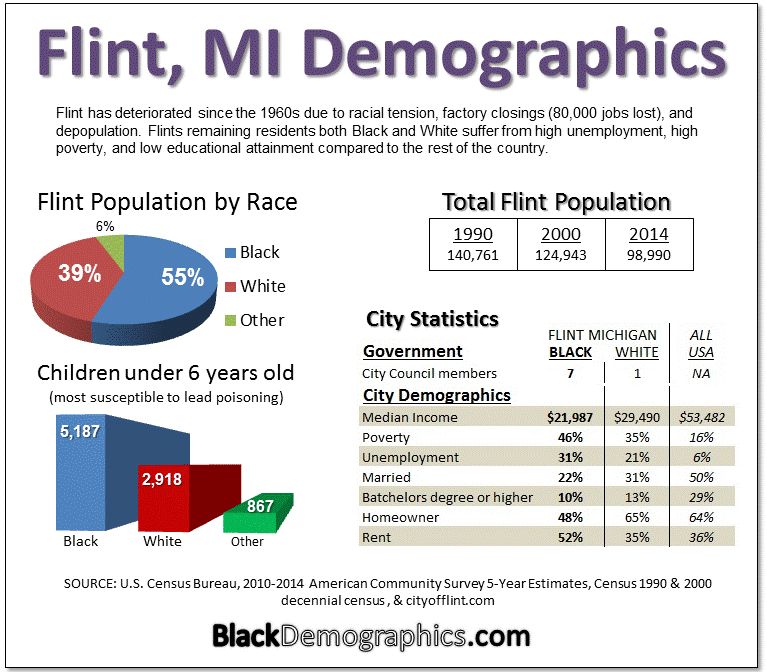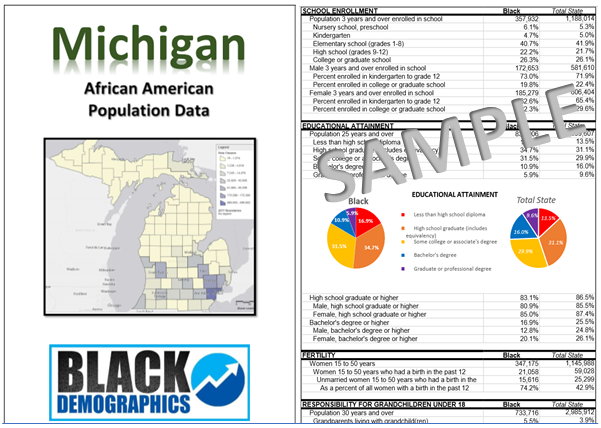Michigan
According to 2020 census data, the Black population in Michigan was around 1,376,579, accounting for approximately 14% of the state’s total population. This includes those who identify as Black alone. for those who identify as Black in combination with one or more races it’s 1,544,122 which is 15% of Michigan’s population.
| State Data | Black Alone | Total State |
| Total population (ACS estimate) | 1,376,579 | 10,050,811 |
| Median household income | $39,488 | $63,498 |
| Bachelor’s degree or higher | 19.5% | 31.7% |
| Family poverty rate | 22.5% | 9.0% |
| Percentage households Married-couple families | 20.9% | 46.3% |
| Homeowner rate | 44.6% | 73.2% |
Source: U.S. Census Bureau, 2021 American Community Survey 1-Year Estimates
GROWTH
Between 1990 and 2020, the Black population in Michigan grew from approximately 1.2 million to over 1.4 million. This growth has been driven by both natural increase and in-migration from other states. As the African American population continues to grow.
A substantial proportion of Michigan’s African American population resides in the Detroit metropolitan area, where they make up around 79% of the city’s population. Other urban areas, such as Flint, Saginaw, and Grand Rapids, also host significant Black populations. Additionally, there are numerous Black residents living in smaller cities, towns, and rural areas across the state.
MIGRATION
Michigan experienced an influx of African Americans during the Great Migration in the early 1900s. Black residents from the South, including states like Georgia, Alabama, and Mississippi, migrated to Michigan in search of better opportunities in the industrial North. Cities like Detroit and Flint offered jobs in the booming automotive industry, which attracted many African American workers.
Socioeconomic Conditions
Historically, the Black population in Michigan has faced socioeconomic challenges, including discrimination, segregation, and limited access to quality education and housing. While progress has been made, disparities still exist in areas such as income, unemployment rates, and homeownership. However, Black residents have made significant strides in local and state politics, as well as in entrepreneurship, entertainment, and arts, contributing to the cultural vibrancy of the state.
HISTORY
The presence of African Americans in Michigan dates back to the 1700s when the region was a French and later British colony. At the time, the Black population was primarily composed of enslaved Africans who were brought to the area to work in various capacities. Michigan was also a significant destination for escaped slaves and a center of abolitionist activity due to its proximity to Canada and the Underground Railroad.
Following the Civil War and the subsequent emancipation of enslaved people, Michigan’s Black population continued to grow. Many African Americans remained in the state, working in various industries, such as the burgeoning automotive sector. The Great Migration of the early 19002 brought a large number of Black residents to Michigan, further shaping the state’s demographic landscape.
Get the Complete Michigan African American Population Report



